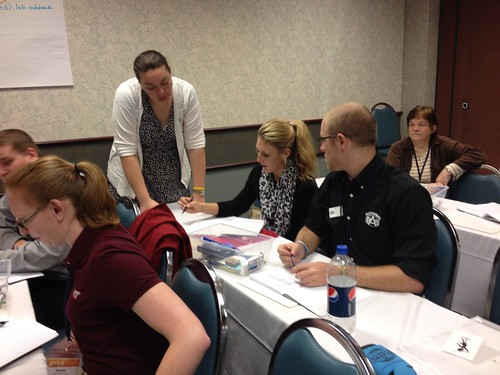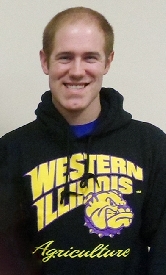University News
Ag Student Chosen for Inaugural National Preservice Agriscience Teacher Program
November 11, 2013
MACOMB, IL -- When he was accepted into the inaugural class for the National Association of Agricultural Educators (NAAE) Preservice Agriscience Teacher Program, Western Illinois University senior Riley Hintzsche (Lindenwood, IL) had no idea he would soon be learning a Double-Stuffed Oreo is, indeed, double stuffed. Hintzsche, an agriculture education major, took part in the NAAE class October 30 at the National FFA Convention in Louisville, KY. The first of its kind for the organization, the program is designed to focus on inquiry-based teaching methods and the enhancement of science in agricultural education. (To learn more about this program, visit www.naae.org/prodev/nataa.html.)
According to Hintzsche, Andy Baker, WIU School of Agriculture interim chair, and Bart Gill, assistant professor, encouraged him to apply for the program, which challenged the participants to develop inquiry-based lessons to use during their student-teaching experiences. Hintzsche noted 36 college students in preservice teacher ag programs from across the U.S. applied for acceptance into the program, and he was one of 16 chosen.
"During the program, our activities consisted of mainly inquiry-based learning, or in other words, helping learners seek answers through questioning. Our program was based on a lot of questions in order to seek answers, and immediately, we started with asking questions for our first lesson, which was, 'Is a Double-Stuffed Oreo Really Double Stuffed?' We were given a digital scale, rulers, notebooks and, of course, the Oreos. With my partner, we were able to determine a Double-Stuffed Oreo truly is double stuffed. With the different lessons we covered, we were able to see how we could apply them to a variety of different classes and atmospheres," he explained.
Hintzsche said the Oreo lesson could be incorporated into a variety of learning environments for teachers to facilitate student learning through inquiry-based methods.
"The Oreo lesson could be used in an ag marketing class to confirm the statement a 'Double-Stuffed Oreo' cookie is a true one or determine if it's a fraudulent advertisement. It could also be used in an introduction to agriculture course, as students would have the opportunity to use their inquiry-based and critical-thinking skills," he said. "As participants in the program, we were challenged on a variety of different levels to think on a inquiry-based level, which meant using our senses and critical-thinking skills to find the answers to a variety of different problems and lessons. Throughout the day, we were handed a variety of lessons that allowed us to explore these skills. Along with this, we were asked to identify factors that overlapped the classroom atmosphere, such as technology, student understanding, classroom management and techniques. We were also asked how these things would relate in different settings."
Baker noted Hintzsche's participation in the NAAE program was beneficial to him as a young adult getting ready to enter into the teaching profession.
"I was fortunate enough to have attended an inquiry-based learning event sponsored by DuPont-Pioneer two years ago. I utilized a lesson from that conference to train my students on the inquiry-based learning methodology, and the approach intrigued Riley enough for him to apply for this opportunity. His attendance at this conference provides him with an advantage as he seeks employment as a teacher, and I know he's anxious to utilize his newfound knowledge in the classroom during his student teaching experience. A big part of teaching is accepting that you will be a life-long learner, and Riley has that figured out," Baker noted.
"I would like to thank Dr. Baker and Dr. Gill for their support. They spent a lot of time reviewing my application before I sent it off." Hintzsche said. "I would also like to thank the National Association of Agriculture Educators and DuPont for their support. Without them, this program would not have been possible."
Hintzsche added he plans to use what he learned from the one-day program during his student-teaching experience at Somonauk High School (Somonauk, IL) next spring.
"As a current student and a future agricultural educator, I have found that using inquiry-based methods can be one of the strongest attributes in teaching and learning. The Agriscience Preservice Program enabled me to receive hands-on training in inquiry-based instruction, and I plan to put those skills to the test upon entering my student-teaching site in the spring. The method—seeking answers through questioning—will help me take a different approach to starting a lesson—to start instruction with those basic senses that all students can relate to," Hintzsche explained. "My hope is from the program, I have strengthened my inquiry skills, so that I am better able to build my lessons off of inquiry-based instruction as student teacher and when I enter into the agriculture education profession in the future."

Western Illinois University senior agriculture major Riley Hintzsche (black shirt) taking part in the National Agriscience Preservice Teacher Program October 30 at the National FFA Convention. (Photo by National Association of Agricultural Educators.)
Posted By: Teresa Koltzenburg (WIUNews@wiu.edu)
Office of University Communications & Marketing


Connect with us: